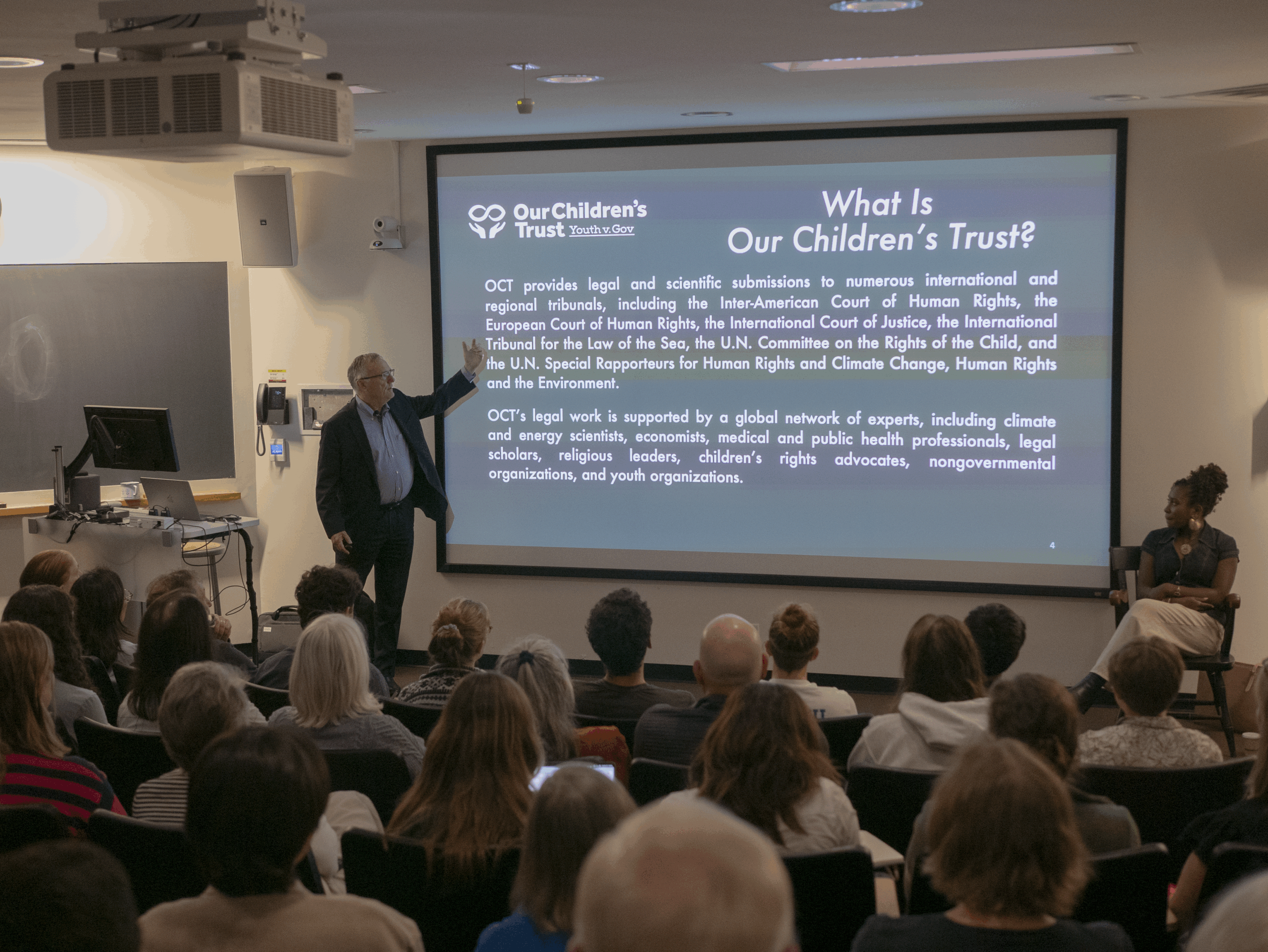Phil Gregory ’76 talks youth-led climate change litigation
October 3, 2025
 Andrew Shi
Andrew ShiOn Tuesday, Philip Gregory ’76, counsel to Our Children’s Trust, an organization that works to represent youth plaintiffs in climate change litigation, spoke to a packed Beam Classroom in the Visual Arts Center. Gregory discussed the progression of the group’s litigation through the courts, as well as the organization’s reactions to the Trump administration’s executive orders.
The talk, titled “Our Constitution, Our Climate, Our Courts,” focused on four of Our Children’s Trust’s landmark cases over the past decade: Juliana v. United States (2020), Held v. Montana (2024), Navahine v. Hawaii (2024) and Lighthiser v. Trump (filed this year). Each of these cases was brought forward by youth plaintiffs in response to environmental policies that were damaging to their health and safety.
Juliana, filed in 2015, influenced how Our Children’s Trust structures their litigation. The group took inspiration from Brown v. Board of Education (1954), ensuring that climate issues were contested not as conflicts damaging a singular person, but rather a systemic problem like the segregation Brown targeted. The 2024 Held case furthered this framework and notched a significant win in the state Supreme Court, establishing a state constitutional right in Montana to “a clean and healthful environment.”
“A decade ago, the idea of youth suing governments for promoting greenhouse gas emissions seemed naive.… The notion that youth might win such cases seemed like a pipe dream, especially to win a case like this in Montana,” Gregory said.
Gregory credited much of the success of Our Children’s Trust in court to their experts, from climate scientists to pediatricians to politicians, all of whom were working pro bono.
“These individuals are doing it all out of their heart and out of their belief in these cases, not for any money,” Gregory said.
Gregory also emphasized the need for making policy changes through the courts, especially given Trump’s executive orders targeting climate science. Through Lighthiser, Our Children’s Trust hopes to receive a preliminary injunction regarding three of Trump’s executive orders dealing with energy and the environment. The case has not yet been decided and is the first of its kind at a federal court.
“We know lawsuits [are] not the way to make policy in the United States, and, in the ideal world, our elected officials would act in a way to prevent climate disasters,” Gregory said. “We all know that’s not happening. So now the courts [are] really the only option for many of these issues to get decided in a way that considers the science and the effect, particularly on the youngest Americans.”
Gregory centered the youth in his own life—particularly his granddaughter, Alice—as the reason why he works at Our Children’s Trust.
“At some point, Alice is going to ask me, ‘Papa, what did you do during the climate wars? Did you sit around bemoaning your fate [and] complaining [about] what’s going on, or [did] you do something about it?’ And I want to look Alice and her brothers, Lincoln and John Jr., in the eye, and I’m gonna count on that I did everything I could,” Gregory said.
Director of Sustainability Keisha Payson organized the talk, as well as a series of other avenues for students to connect with Gregory. These included a pre-talk dinner, a morning coffee meet-and-greet sponsored by Career Exploration and Development on Wednesday and a visit to Adjunct Lecturer in Environmental Studies Conrad Schneider’s Environmental Law and Policy class.
“I just wanted to take advantage of the opportunity of having [Gregory] here on campus. I wanted to provide as many opportunities for students to engage with him and have conversations. Not everybody could go to the talk,… so I just thought, ‘Okay, let’s try to open this up as much as possible,’” Payson said.
Payson emphasized the importance of hope in climate work as a motivating factor for bringing Gregory to campus.
“There’s a lot of not great news about climate. You talk about wildfires, hurricanes, flooding, lots of natural disasters and the impacts of those…, both physically and emotionally. So [it’s hopeful] any time we can feel like there’s something we can do about it or a way to engage like the work that Phil Gregory is doing,” Payson said.
Students also found inspiration in Gregory’s visit.
“I thought it was really interesting to hear from someone who has so much experience within the environmental realm and someone who also went to Bowdoin,” Ella Bender ’29 said. “Seeing that there is a possibility to go on and make a bigger impact was just really cool.”
Comments
Before submitting a comment, please review our comment policy. Some key points from the policy:
- No hate speech, profanity, disrespectful or threatening comments.
- No personal attacks on reporters.
- Comments must be under 200 words.
- You are strongly encouraged to use a real name or identifier ("Class of '92").
- Any comments made with an email address that does not belong to you will get removed.

Thank you Phil Gregory. Trump is lying – the climate crisis inexorably deepens every year. There is hope though, as Jane Goodall reminded us. So many ways to contribute to positive change – like the Green Amendment movement, or at the very least, being aware of one’s carbon and consumption footprint.